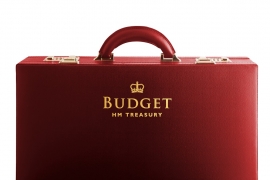Archived article
Please note that tax, investment, pension and ISA rules can change and the information and any views contained in this article may now be inaccurate.

The big rabbit out of Rishi Sunak’s hat was announcing a cut to income tax rates from 2024, and while that will grab the headlines it’s precisely zero help to families struggling with the cost-of-living crisis now – or indeed for the next two years.
The announcement today, which clearly could have waited until the full Budget later this year, appears to be the Chancellor’s way of coming through on his promise to deliver a low-tax nation without actually handing the tax cut to the nation now. Opposition MPs and his own peers had called on him to do more to help families who are facing rising bills now, but on the basis that those bills can’t be paid with an IOU for two years’ time, many will think he’s fallen short of this task.
Fuel duty
The giveaway for motorists was in the cutting of fuel duty by 5p litre, saving British motorists £7m a day. This means for the average 55 litre car someone will save £3.30 each time they fill up*. However, this is a tiny portion of the amount we’ve all seen fuel costs rise by: since the start of the month alone petrol prices have risen by 13p and diesel prices by 21p.
What’s more, with petrol at 167p per litre, 86p of that goes to the Government, in fuel duty and VAT, more than half the cost. So there was definitely scope to go further and it’s scant help for those who don’t use their car regularly or don’t own a car. But cutting fuel duty does have a double impact for consumers, as it cuts the costs for businesses too, who in turn can pass on the cost savings – or at least not increase their prices by so much.
Saving £3.30 every time you fill up also isn’t going to make a dent in the expected £1,500 increase every household is going to see in their home energy bills this year alone. And on that topic, the Chancellor had very little to say.
£550m for struggling familiesThe Chancellor boosted previously-announced help for people struggling the most, by increasing the £500m fund available for local councils to dish out to those most in need. This will frustrate lots of people who called for more direct and automatic support for households. By allocating the cash to local councils it means people have to be aware that help is available and actively apply, rather than the money being handed to those who would benefit the most.
National InsuranceThe Chancellor went one step further than the leaked plans and extended the National Insurance threshold to £12,570, meaning that anyone earning below this limit will pay no income tax and no National Insurance. By bringing in the move in July, rather than immediately, taxpayers won’t get a full year of the benefit. But it will still mean that the average worker who earns more than the £12,570 threshold will save £330 a year, once the change kicks in. The Government says that 70% of people currently paying National Insurance will see a reduction in their bill, even with pushing ahead with the increased 1.25% levy.
*This takes into the account the fact that the 20% rate of VAT on top will be lower as the total petrol price per litre is lower.
These articles are for information purposes only and are not a personal recommendation or advice.

